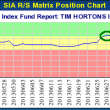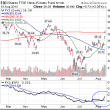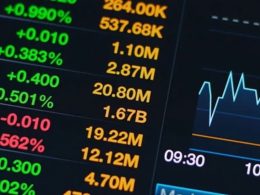by Eddy Elfenbein, Crossing Wall Street
When I was heading up to Maine recently, I stopped at a diner in New Jersey and was eating a chili dog when I got an email from blog-sensei Barry Ritholtz. Barry wanted my take on a factoid mentioned in Forbes. Specifically, the magazine wrote:
Here’s a jaw-dropper: Over the past 100 years, dividends were responsible for 90% of U.S. stock returns, says money manager BlackRock.
Barry was skeptical and I could see why. The conventional view is that half of returns have come from dividends. Nowadays, there are a lot of companies that don’t even pay a dividend. Even dividend payers retain a large portion of their earnings. So how could dividends be responsible for nearly all of stock returns?
I saw in the email chain that Barry had contacted the folks at Forbes and they provided him three items of documentation; a research piece from BlackRock, a research item from GMO and a section of Daniel Peris’ book “The Strategic Dividend Investor.” Forbes said they decided to use BlackRock for attribution.
I looked at all three sources and each one repeated the same claim—that dividends account for 90% of U.S. stock returns. The BlackRock and GMO items merely repeated the fact, but Peris was the only one who explained where the 90% number came from.
This is either one of the most remarkable discoveries in the history of finance, or something is wrong. Well…I’ve looked into it and I can safely report that something is off—dividends haven’t accounted for 90% of stock returns.
The hitch is that the claim is that 90% of returns are derived from dividends, not specifically dividends themselves. This is a bit of logical sleight-of-hand. The problem is that this sleight-of-hand doesn’t reveal any important truths. Instead, it makes a point which is ultimately irrelevant.
I’ll show you what I mean, or rather, what they mean.
Let’s take a stock that at the beginning of the year pays a 5% dividend. During the year, the dividend is increased by 10%. Let’s say that the stock also rises by 10% during the year. Well, Paris et al claim that the 10% stock rise is derived by the dividend payment since the shares are merely keeping up with the dividend. Ergo, the return derived from dividends is the 5% dividend plus the 10% stock increase. In other words, all of the stock’s returns (15% out of 15%) are derived from dividends.
Simple, right?
Er…not exactly. The problem is that if you’re claiming that any stock increase that’s commensurate with a dividend increase is “derived from dividends,” you’re ironically not saying anything about what dividends really do. I’m not saying that the point is wrong. It’s worse. It’s taken so far from a logical foundation that it’s meaningless.
Let’s take the same example I just used, but instead let’s say our stock pays a 0.001% dividend at the beginning of the year. The dividend is again increased by 10% during the year, and the shares also rise by 10%. Once again, according to their logic, we can say that all of the stock’s gain is derived from dividends. Of course, any investor would clearly understand that dividends played almost no role in their gains for that year.
(Using this same logic, I suppose we could extend this example even further by saying that a stock that pays no dividend has all of its return derived from its dividend. I’m not being sarcastic—that exactly what this logic implies.)
The fact is that we should expect stocks to gain as much as dividends. Using this “derived” context is a too-cute way of claiming everything for dividends. All the 90% number tells us is that dividend growth has lagged share price growth over the past several decades. That’s all it means and nothing else.
Well…so what? That’s a well-understood fact. Dividend payout ratios aren’t what they used to be.
If the phenomenon had gone the other way and payout ratios had steadily climbed over the years, this logic would say that over 100% of stock returns have been derived from dividends.
Barry was correct. This factoid is of little use to investors.
Let me also add that from what I’ve seen of Paris’ book, it looks to be a sound book on investing. I’m merely objecting to the logic used in this one instance.
Posted by Eddy Elfenbein on June 13th, 2011 at 9:40 am
The information in this blog post represents my own opinions and does not contain a recommendation for any particular security or investment. I or my affiliates may hold positions or other interests in securities mentioned in the Blog, please see my Disclaimer page for my full disclaimer.













